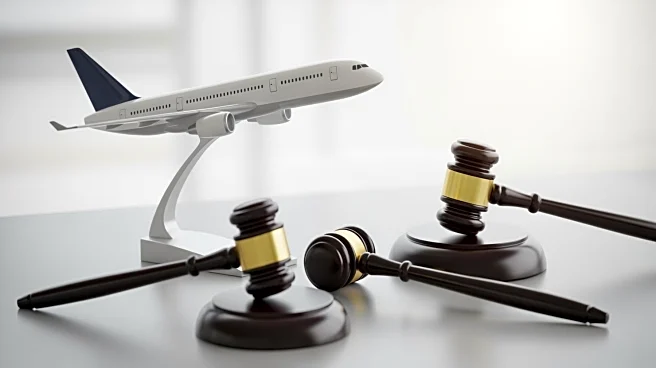What's Happening?
In a significant development in the ongoing litigation surrounding the 2019 crash of a Boeing 737 MAX8, three cases have been settled just before trial proceedings were set to begin. The settlements were reached late on November 4, 2025, in a federal
district court, following a full day of jury selection. The crash, which occurred shortly after takeoff from Addis Ababa Bole International Airport in Ethiopia, resulted in the deaths of all 157 passengers on board. Robert A. Clifford, founder and senior partner of Clifford Law Offices, announced the settlements, which include the case of a 28-year-old mother from Kenya. The case of a 36-year-old woman from India, represented by Kline & Specter, is set to proceed to trial. The settlements were reached for confidential amounts, and the cases involved individuals from Kenya, Yemen, and the UK, all of whom left behind families. Seven cases remain unresolved following these settlements.
Why It's Important?
The settlements mark a critical juncture in the legal proceedings related to the Boeing 737 MAX8 crash, highlighting the ongoing impact of the tragedy on the victims' families and the aviation industry. The resolution of these cases provides some measure of closure for the families involved, while also underscoring the legal and financial repercussions for Boeing. The settlements may influence the outcomes of the remaining cases and set precedents for future aviation litigation. The case proceeding to trial will continue to draw attention to the safety and regulatory issues surrounding the Boeing 737 MAX8, which has faced global scrutiny and led to significant changes in aviation safety protocols.
What's Next?
As the trial for the case of the Indian victim proceeds, it is expected to further explore the circumstances surrounding the crash and Boeing's accountability. The outcome could have implications for the remaining unresolved cases and potentially influence future regulatory measures in the aviation industry. Stakeholders, including aviation safety advocates and regulatory bodies, will be closely monitoring the trial's progress and its impact on aviation safety standards.
















